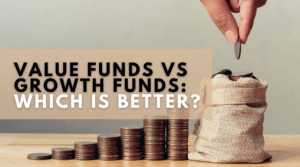Most people who are enthusiastic about mutual funds have this doubt. Which is better? Value Funds or Growth Funds?
Well, today we are here to help you clarify this confusion. In that way, you can know better about these and which is right for you.
Let us begin by getting in-depth information on each of these mutual funds. By doing so, we will have a better idea of both types of funds.
My contact details are hello@adamfayed.com and WhatsApp +44-7393-450-837 if you have any questions.
The information in this article is for general guidance only. It does not constitute financial, legal, or tax advice, and is not a recommendation or solicitation to invest. Some facts may have changed since the time of writing.
Mutual Funds
Imagine a pool of money. This pool gets created from the funds/assets invested by various investors. Now, all the money is invested in securities such as stocks, bonds, etc.
Professional money managers handle these funds and are referred to as Fund Managers. They can sometimes be called Investment Advisers as well.

These fund managers use the pooled funds for generating capital gains or income.
Such an investment vehicle is called a Mutual Fund. The most common types of securities in which the funds get invested are as follows:
— Stocks
— Bonds
— Money Market Instruments
Recently, some mutual funds are investing in innovative securities such as cryptocurrencies.
The pooled money from mutual funds can invest in other funds as well. This investment may be done in other hedge funds, mutual funds, or any other funds.
Note: A hedge fund uses innovative strategies for earning greater returns. There may be a possibility for aggressive strategies, derivatives and leverage. Hedge funds are only available for accredited investors.
With mutual funds, you can access professionally managed portfolios. That is even if you are a small and individual investor.
The categorization of mutual funds is done on the basis of:
— Types of Securities
— Investment Objectives
— Types of Returns
In some countries, employer-sponsored retirement plans comprise investments in mutual funds.
The general types of fees and charges related to mutual funds are as follows:
— Fees
— Expense Ratios
— Commissions
All these fees and charges affect the total returns earned by investors. There are three methods through which mutual funds generate income.
First, income is obtained from mutual funds in the form of dividends. The income from mutual funds can either be taken by the investors or reinvested.
The second method is Capital Gains. Mutual funds may have securities that increase in value.
When they sell these securities, they generate returns in the form of capital gains. They may either be distributed among the investors or reinvested.
Finally, when the mutual fund you own increases in value, and then you can sell it for a profit.
Value Funds
There are some companies that are considered undervalued in price (stock price). This is estimated on the basis of the fundamental characteristics of that company. This is also called Fundamental Analysis.
The fund that invests in the stocks of such companies is known as a Value Fund.
After there is a significant increase in these stock prices, the value of the fund increases. In this way, the fund generates returns for its investors, i.e., through fund value appreciation.
Most of the value funds are made in well-established companies. These funds offer returns in the form of dividend payments.
How do Value Funds work?

Great investors like Warren Buffet, Bill Ackman, and many others are value investors.
The value investing approach is like the strategies of Warren Buffet and some others.
As we said, the stock evaluation for value funds depends on fundamental characteristics.
The selection of stocks in a value fund is primarily based on Market Capitalization.
Almost all the big fund families offer value funds to their investors. There are three types of value funds. They are:
— Small-Cap Value Funds
— Mid-Cap Value Funds
— Large-Cap Value Funds
Investors who choose value funds seek to have a long-term investment solution.
Therefore, this is a conservative investment apt for patient investors. Most value funds have a scope for stable growth periodically.
The stock price may be undervalued because of certain market inefficiencies. The value fund managers are very skilled in identifying these market inefficiencies.
Pros and Cons of Value Funds
Pros
• Value funds are not exclusive to a specific class of people (rich).
• Value funds are known to provide better results over the long term.
• Most value funds offer dividends and capital gains as well.
• If opted for reinvesting, value funds offer the best results. This is through the strategy of compounding.
• Value funds are a great way to take advantage of the stock market situation. Especially, during a bullish market.
• Value funds are less susceptible to risk compared to other types of mutual funds.
• The volatility of value funds is also moderate, which is good for people without a higher risk tolerance.
Cons
• Most beginner investors may not easily handle investments in value funds.
• A lot of research and patience are required for investing in value funds.
• Evaluating the intrinsic value of the stocks in a value fund is very difficult.
Growth Funds
A growth fund focuses on assets that concentrate on capital appreciation. There is no scope for dividend payouts, or even if there is, dividend payouts are minimum.

The portfolio of these funds consists of assets with more than average growth. These companies reinvest their profits into aspects such as:
— Expansion of Business
— Acquisitions
— Research and Development (R&D)
Basically, growth funds come with a higher potential for capital appreciation. Anyhow, they come with an above-average amount of risk involved.
How do Growth Funds work?
Growth funds are also classified on the basis of market capitalization. They are:
— Small-Cap Growth Fund
— Mid-Cap Growth Fund
— Large-Cap Growth Fund
The main concept of growth funds is based on a higher reward for higher risk. Because of growth funds’ nature of higher risk, higher risk tolerance is required.
Even these funds are selected by investors looking for a long-term solution.
The general term chosen for growth fund ranges between five to ten years. Growth funds have higher Price-To-Earnings (P/E) and higher Price-To-Sales (P/S) multiples.
Growth funds come with higher volatility compared to value funds. They are in the most common category of mutual funds chosen by investors.
Foreign large-cap growth funds come with a lower market share. These are prominent among investors looking to take advantage of global growth.
Foreign growth funds invest in international stocks or assets. These international assets are known for higher growth in revenue and earnings.
International growth funds usually target consumer and technology sectors.
Over the last decade, many best-performing large-cap stock funds were growth funds.
Pros and Cons of Growth Funds
Pros
• The primary advantage of investing in growth funds is the possibility of higher returns.
• A great way of diversifying your portfolio while investing aggressively.
• Highly qualified professionals take care of the fund management in growth funds.
• Apart from the fund fees, there may not be any additional expenses. This is because all the investment-related activity is handled by fund managers.
Cons
• Growth funds come with higher risks. Therefore, they are only suitable for investors with higher risk tolerance.
• Growth funds are highly volatile and may rapidly fall during bad market conditions.
• Because of the expert fund management team involved, growth funds have higher costs.
• Value depreciation is a drawback because of its vulnerability to bearish markets.
• Dividend payments aren’t provided with growth funds, which is something to be noticed.
• Because of its risky nature, investors with a long-term strategy are prone to profits.
Value Funds vs Growth Funds
Value funds have the main objective of expecting better performance.
On the other hand, investments in growth funds are made expecting growth at a faster pace.
Some analysts claim that value funds perform better compared to growth funds. This is regardless of the uncertain market conditions and economic situations.
Otherwise, growth funds perform better when the markets are performing better.
Let’s see a few indicators. These indicators contribute to the comparison between value funds and growth funds.
Past performance
Past performance does not contribute to the fund’s performance. This applies to both growth funds and value funds.
Timing the markets may not be a good idea when you are investing in either of them.
However, most analysts say that the best time to buy growth funds is when they are good. This is during the mature stage of an economic cycle, i.e., a couple of months before a recession.
The people who invest during such a time must be prepared to sell before an economic downturn.
Volatility
People who profit from value stocks get returns in three ways. they are capital gains, dividends, or the appreciation in the fund’s value.
Whereas the growth fund is wholly dependent on capital appreciation for generating returns.
Those who invest in value funds do not have to wholly depend on capital appreciation. This is because they can generate returns in the form of dividends and capital gains.
Therefore, growth fund investors have to face more volatility. Particularly in terms of capital appreciation.
Value funds perform fine during the economic recovery stage. Nevertheless, this performance may be stable when the stock markets are stable.
It is wise to invest in funds long before a recession, especially for the long term.
Returns
Value fund managers have specific criteria for selecting stocks or assets.
These stocks are generally being traded at a value that is way lower than it should be. They are selected based on the idea that the price will increase.
Certain factors such as Debt-To-Equity or Price-To-Earnings (P/E) are taken into consideration.
The theoretical objective of investment in a value fund is to get a better price than the current price.
When a bear market is at its peak, value funds tend to lose their performance.
In usual circumstances, growth funds have a better performance than value funds. This is because the focus is on growth and the gains reinvested regularly.
However, a higher risk is involved in growth funds. Moreover, bear markets have a higher impact on growth funds.
Considering the overall returns, growth funds may offer higher returns. But there is a higher chance of experiencing losses with growth funds during a bear market.
Final Comments
Value funds may be available for a lower price compared to growth funds. Growth funds have a higher potential for offering more returns.
During a bear market, growth funds decrease rapidly in value. When investing for a longer term, both funds offer a better result. Growth funds tend to have a higher performance though.
If you expect a full bullish swing in the market, then it is better to go ahead with growth funds. For that, you must have higher risk tolerance.
If you are looking for a long-term solution, then value funds may be better. Additionally, value funds are better for those looking for a conservative investment.
No matter what, diversifying your portfolio will give you better results. Therefore, you can try alternative options such as index funds or blend funds.
Sometimes an individual can benefit much more from investing in a blend fund. A blend fund is a combination of both value and growth stocks. In this way, investors get a diversified portfolio and exposure to both types of funds.
Alternatively, index funds are also deemed a great choice among individual investors. Index funds tend to replicate the performance of the index they track. This means the performance is the same as that of the underlying index. The performance of these funds theoretically matches the performance of the market.
Finally, investing in a single type of asset will make you susceptible to risk. We suggest having a diversified portfolio and reallocating assets every now and then.
Pained by financial indecision?

Adam is an internationally recognised author on financial matters with over 830million answer views on Quora, a widely sold book on Amazon, and a contributor on Forbes.



